英语省略句
- 格式:ppt
- 大小:1.35 MB
- 文档页数:22
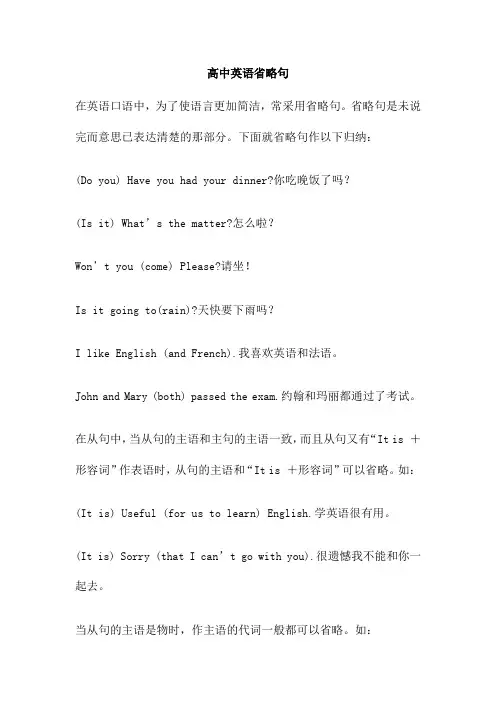
高中英语省略句在英语口语中,为了使语言更加简洁,常采用省略句。
省略句是未说完而意思已表达清楚的那部分。
下面就省略句作以下归纳:(Do you) Have you had your dinner?你吃晚饭了吗?(Is it) What’s the matter?怎么啦?Won’t you (come) Please?请坐!Is it going to(rain)?天快要下雨吗?I like English (and French).我喜欢英语和法语。
John and Mary (both) passed the exam.约翰和玛丽都通过了考试。
在从句中,当从句的主语和主句的主语一致,而且从句又有“It is +形容词”作表语时,从句的主语和“It is +形容词”可以省略。
如:(It is) Useful (for us to learn) English.学英语很有用。
(It is) Sorry (that I can’t go with you).很遗憾我不能和你一起去。
当从句的主语是物时,作主语的代词一般都可以省略。
如:The book (that I read yesterday) is very interesting.我昨天读的那本书很有趣。
在定语从句中,当先行词在定语从句中作状语时,关系代词可以省略。
如:The way (that/which) we use is more convenient.我们使用的方法更简便。
The reason (why) he was late is that he had to help the old lady across the street.他迟到的原因是他得帮助那位老太太过马路。
在一些表示建议、请求、命令等含义的动词后的宾语从句中,谓语动词常省略。
如:I suggest (that) we (should) discuss the matter.我建议我们讨论这个问题。
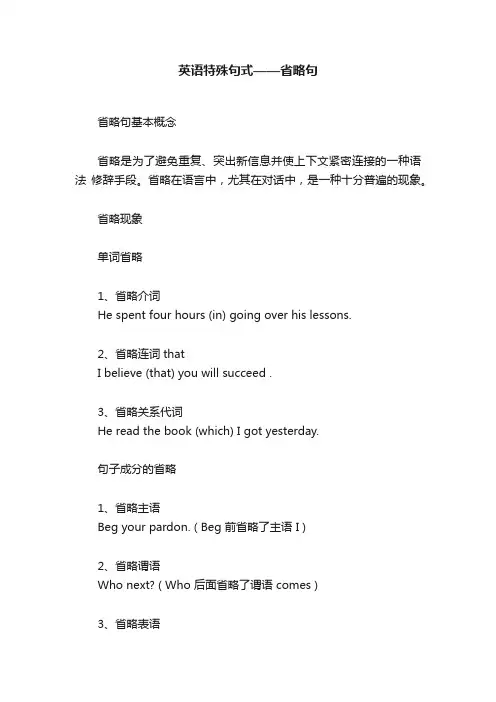
英语特殊句式——省略句省略句基本概念省略是为了避免重复、突出新信息并使上下文紧密连接的一种语法修辞手段。
省略在语言中,尤其在对话中,是一种十分普遍的现象。
省略现象单词省略1、省略介词He spent four hours (in) going over his lessons.2、省略连词thatI believe (that) you will succeed .3、省略关系代词He read the book (which) I got yesterday.句子成分的省略1、省略主语Beg your pardon. ( Beg 前省略了主语 I )2、省略谓语Who next? ( Who 后面省略了谓语 comes )3、省略表语Are you ready? Yes, I am. ( am 后面省略了 ready )4、省略宾语Let ' s do the dishes. I ' ll wash and you ' ll dry. ( wash 和 dry 后面省略了宾语 dishes )5、省略定语He spent part of the money, and the rest he saved. ( the rest 后面省略了定语 of the money )6、省略状语He was not hurt. Strange! ( Strange 前面省略了状语 how )不同句式中的省略1.简单句中的省略:在对话中,交谈双方都知道谈论的对象,则可以省略句子的主语,省略主语和谓语的现象在交际用语中出现的很多。
Sounds like a good idea.2.并列句中的省略:在并列句中,相同的成分如主语,谓语,宾语等都可以省略。
They learn French and we English.3.复合句中的省略:定语从句:That’s the reason he is late for the conference.状语从句:(1)时间状语从句中,省略“主语+be”:When (she was) very young,she began to learn to play the violin.(2)条件状语从句中,省略“主语+be”:If (he is) given more time, he will do the work better.(3)让步状语从句中,省略“主语+be”:Though (he is) a young man, he has made several inventions. (4)方式状语从句中,省略“主语+be”:She talked to the stranger as if (she were) absent-minded.(5)比较状语从句省略相关成分:由than或as引导的比较状语从句,在意义明确的情况下,可以省略than或as后面的相应部分,这一点与上述情况不同。
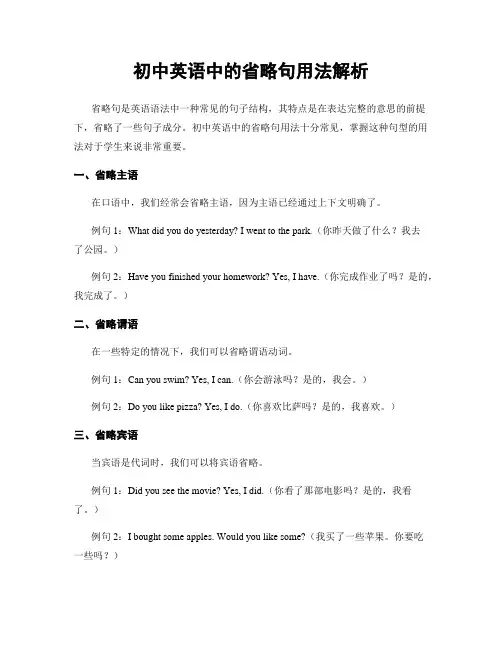
初中英语中的省略句用法解析省略句是英语语法中一种常见的句子结构,其特点是在表达完整的意思的前提下,省略了一些句子成分。
初中英语中的省略句用法十分常见,掌握这种句型的用法对于学生来说非常重要。
一、省略主语在口语中,我们经常会省略主语,因为主语已经通过上下文明确了。
例句1:What did you do yesterday? I went to the park.(你昨天做了什么?我去了公园。
)例句2:Have you finished your homework? Yes, I have.(你完成作业了吗?是的,我完成了。
)二、省略谓语在一些特定的情况下,我们可以省略谓语动词。
例句1:Can you swim? Yes, I can.(你会游泳吗?是的,我会。
)例句2:Do you like pizza? Yes, I do.(你喜欢比萨吗?是的,我喜欢。
)三、省略宾语当宾语是代词时,我们可以将宾语省略。
例句1:Did you see the movie? Yes, I did.(你看了那部电影吗?是的,我看了。
)例句2:I bought some apples. Would you like some?(我买了一些苹果。
你要吃一些吗?)四、省略连接词在复合句中,当主句和从句的主语相同时,我们可以省略连接词。
例句1:He is good at playing basketball and I am good at playing football.(他擅长打篮球,而我擅长踢足球。
)例句2:She likes singing and dancing.(她喜欢唱歌跳舞。
)五、省略定语从句中的关系词在定语从句中,当关系代词在从句中作宾语时,我们可以将关系代词和be动词一起省略。
例句1:The book (that) I borrowed from the library is very interesting.(我从图书馆借的那本书非常有趣。
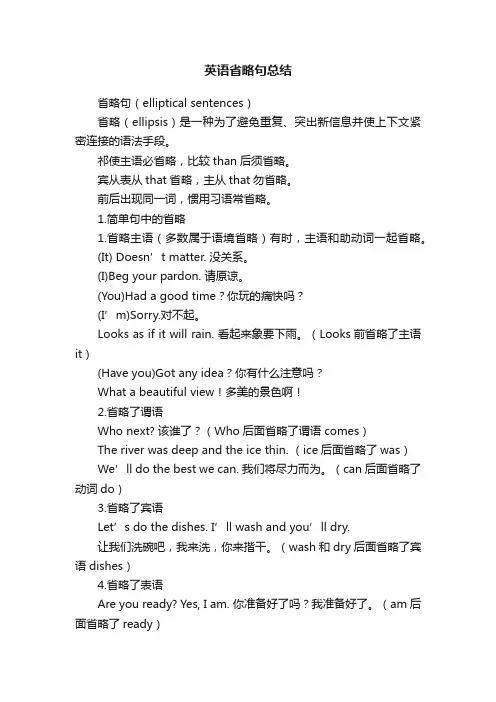
英语省略句总结省略句(elliptical sentences)省略(ellipsis)是一种为了避免重复、突出新信息并使上下文紧密连接的语法手段。
祁使主语必省略,比较than后须省略。
宾从表从that省略,主从that勿省略。
前后出现同一词,惯用习语常省略。
1.简单句中的省略1.省略主语(多数属于语境省略)有时,主语和助动词一起省略。
(It) Doesn’t matter. 没关系。
(I)Beg your pardon. 请原谅。
(You)Had a good time?你玩的痛快吗?(I’m)Sorry.对不起。
Looks as if it will rain. 看起来象要下雨。
(Looks前省略了主语it)(Have you)Got any idea?你有什么注意吗?What a beautiful view!多美的景色啊!2.省略了谓语Who next? 该谁了?(Who后面省略了谓语comes)The river was deep and the ice thin. (ice后面省略了was)We’ll do the best we can. 我们将尽力而为。
(can后面省略了动词do)3.省略了宾语Let’s do the dishes. I’ll wash and you’ll dry.让我们洗碗吧,我来洗,你来揩干。
(wash和dry后面省略了宾语dishes)4.省略了表语Are you ready? Yes, I am. 你准备好了吗?我准备好了。
(am后面省略了ready)He was a lover of sports as he had been in his youth.他还是象年轻时那样,是一位运动爱好者。
(had been后面省略了a lover of sports)5.省略了状语He was not hurt. Strange! 他没有受伤,真奇怪!(Strange前面省略了状语how)6.同时省掉句子几个成份。
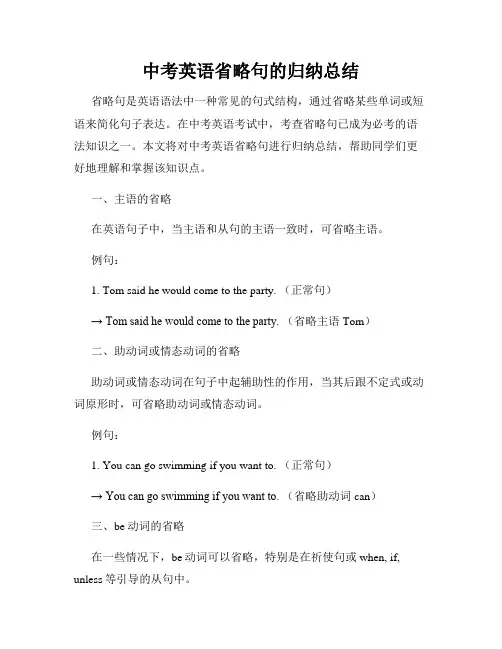
中考英语省略句的归纳总结省略句是英语语法中一种常见的句式结构,通过省略某些单词或短语来简化句子表达。
在中考英语考试中,考查省略句已成为必考的语法知识之一。
本文将对中考英语省略句进行归纳总结,帮助同学们更好地理解和掌握该知识点。
一、主语的省略在英语句子中,当主语和从句的主语一致时,可省略主语。
例句:1. Tom said he would come to the party. (正常句)→ Tom said he would come to the party. (省略主语Tom)二、助动词或情态动词的省略助动词或情态动词在句子中起辅助性的作用,当其后跟不定式或动词原形时,可省略助动词或情态动词。
例句:1. You can go swimming if you want to. (正常句)→ You can go swimming if you want to. (省略助动词can)三、be动词的省略在一些情况下,be动词可以省略,特别是在祈使句或when, if, unless等引导的从句中。
例句:1. Be quiet and listen to the teacher. (正常句)→ Be quiet and listen to the teacher. (省略be动词)四、状语的省略当主句和从句之间的时间状语、地点状语、方式状语等相同或相似时,可将其在从句中省略。
例句:1. He lives in Beijing and I live in Beijing. (正常句)→ He lives in Beijing and I do too. (省略相同的地点状语in Beijing)五、连接词的省略在句子中,连接词如and, but, or等可以省略,特别是在并列句中。
例句:1. She is tall and she is thin. (正常句)→ She is tall and thin. (省略连接词and)六、祈使句中的省略在祈使句(祈使句用于表达命令、请求、劝告等)中,主语you可以省略。
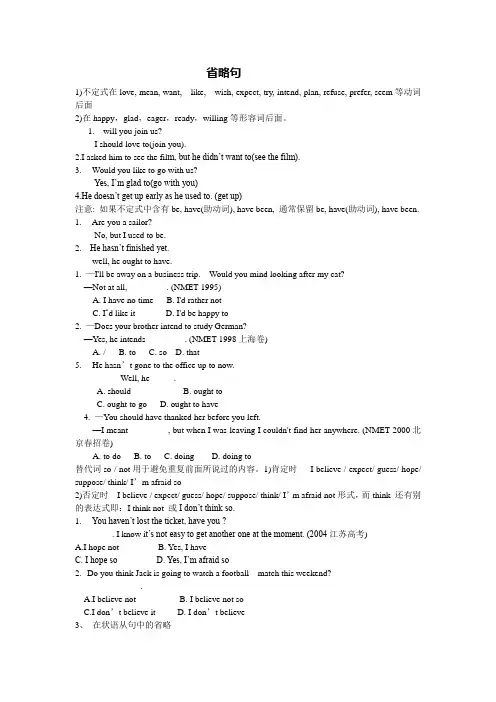
省略句1)不定式在love, mean, want, like, wish, expect, try, intend, plan, refuse, prefer, seem等动词后面2)在happy,glad,eager,ready,willing等形容词后面。
1.---will you join us?--- I should love to(join you).2.I asked him to see the fil m, but he didn’t want to(see the film).3.--- Would you like to go with us?--- Yes, I’m glad to(go with you)4.He doesn’t get up early as he used to. (get up)注意: 如果不定式中含有be, have(助动词), have been, 通常保留be, have(助动词), have been.1.--- Are you a sailor?--- No, but I used to be.2.---He hasn’t finished yet.---well, he ought to have.1. —I'll be away on a business trip. Would you mind looking after my cat?—Not at all, ________ . (NMET 1995)A. I have no timeB. I'd rather notC. I‘d like itD. I'd be happy to2. —Does your brother intend to study German?—Yes, he intends ________ . (NMET 1998上海卷)A. /B. toC. soD. that5.--- He hasn’t gone to the office up to now.--- Well, he _____.A. shouldB. ought toC. ought to goD. ought to have4. —You should have thanked her before you left.—I meant ________ , but when I was leaving I couldn't find her anywhere. (NMET 2000北京春招卷)A. to doB. toC. doingD. doing to替代词so / not用于避免重复前面所说过的内容。

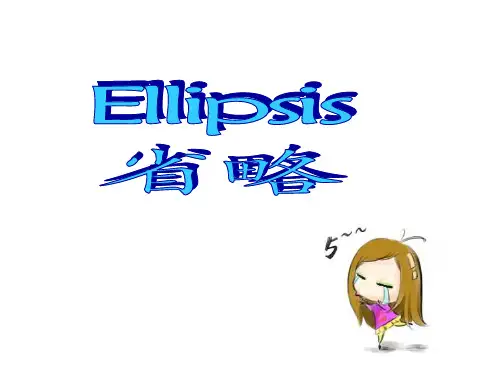
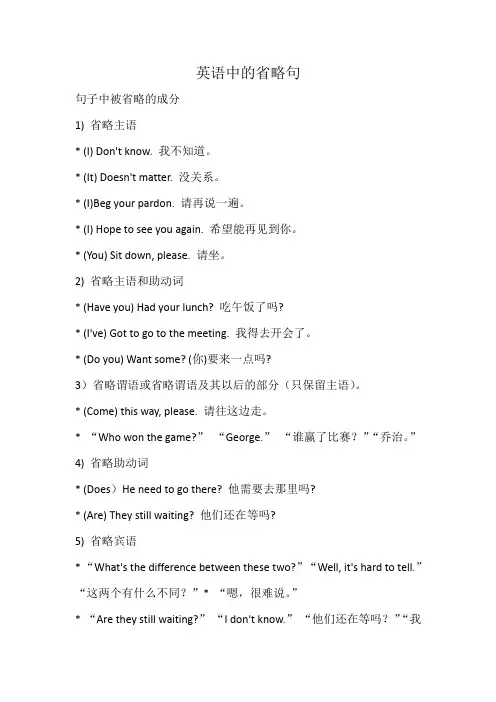
英语中的省略句句子中被省略的成分1) 省略主语* (I) Don't know. 我不知道。
* (It) Doesn't matter. 没关系。
* (I)Beg your pardon. 请再说一遍。
* (I) Hope to see you again. 希望能再见到你。
* (You) Sit down, please. 请坐。
2) 省略主语和助动词* (Have you) Had your lunch? 吃午饭了吗?* (I've) Got to go to the meeting. 我得去开会了。
* (Do you) Want some? (你)要来一点吗?3)省略谓语或省略谓语及其以后的部分(只保留主语)。
* (Come) this way, please. 请往这边走。
* “Who won the game?”“George.”“谁赢了比赛?”“乔治。
”4) 省略助动词* (Does)He need to go there? 他需要去那里吗?* (Are) They still waiting? 他们还在等吗?5) 省略宾语* “What's the difference between these two?”“Well, it's hard to tell.”“这两个有什么不同?”* “嗯,很难说。
”* “Are they still waiting?”“I don't know.”“他们还在等吗?”“我不知道。
”6)省略主语和谓语* No, there won't. 不,不会有。
* Yes, there will. 是的,将会有。
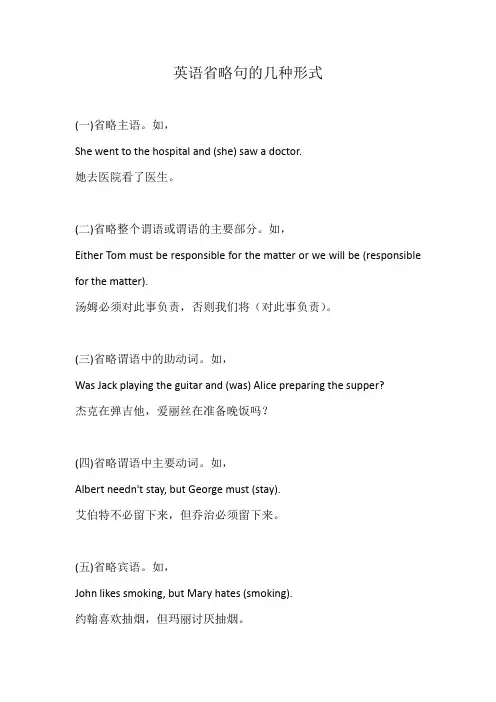
英语省略句的几种形式
(一)省略主语。
如,
She went to the hospital and (she) saw a doctor.
她去医院看了医生。
(二)省略整个谓语或谓语的主要部分。
如,
Either Tom must be responsible for the matter or we will be (responsible for the matter).
汤姆必须对此事负责,否则我们将(对此事负责)。
(三)省略谓语中的助动词。
如,
Was Jack playing the guitar and (was) Alice preparing the supper?
杰克在弹吉他,爱丽丝在准备晚饭吗?
(四)省略谓语中主要动词。
如,
Albert needn't stay, but George must (stay).
艾伯特不必留下来,但乔治必须留下来。
(五)省略宾语。
如,
John likes smoking, but Mary hates (smoking).
约翰喜欢抽烟,但玛丽讨厌抽烟。
![[英语语法]省略句](https://uimg.taocdn.com/7c175fe8102de2bd96058823.webp)
省略句定义:为了使语言简洁或避免重复,要省略句中的一个或几个成分,这种语法现象称之为省略。
英语中省略现象较为普遍,对省略的考查已成为高考中的热点。
句子成分的省略,可分为以下几种情况:1.省略主语,主谓语或主谓的一部分2.不定式符号to的省略3.不定式结构中动词的省略4.状语从句中的省略5.定语从句中关系词的省略6.虚拟语气中if和should的省略7.考查not,so,neither,nor的“替代性”省略省略句常见情况具体分析:1,在有and连接的句子中为了避免重复,长省略一些重复的词或者词组:1),省略共同的主语或者宾语。
Mr Smith picked up a coin on the road and (Mr Smith) handed it to a policeman.2),若主语不同,而谓语,助动词或者情态动词相同,则省略后面的助动词或情态动词。
Jack must have been playing football and Mary (must have been ) doing her homework.3), 若主语与谓语动词相同,则省略后面的主谓成分。
His advice made me happy, but (his advice made) Jim angry.4),若主语不同的话,但主要动词及后续部分相同,则省略主要动词及后续部分。
I was born in winter 1998, and Bob (was born ) in 1989.5) 省略重复的介词,连词及后续部分。
He was late because he had overslept and (because he had ) missed the train.2,状语从句的省略1),在when, while, whenever, till, as soon as, if, unless, as if, though 等引导的状语从句中,其实是:包括时间,让步,方式等一些状语从句中,若从句主语和主句主语相同,或者是it时,且从句的主语为be动词时,则从句中的主语和be动词常全部被省略。
完整版英语省略句的六大总结
1.主语省略:当主语已经被上下文所明确时,可以省略主语。
例句:(原句)I am going to the bookstore.
(省略) Going to the bookstore.
2.谓语动词省略:当谓语动词已经被上下文所明确时,可以省略谓语动词。
例句:(原句)She can play tennis very well.
(省略) She can play very well.
3.宾语省略:当上下文中已明确了宾语时,可以省略宾语。
例句:(原句) Would you like to have some watermelon?
(省略) Would you like some?
4.介词省略:当介词与其宾语紧密相连,且已明确时,可以省略介词。
例句:(原句) We are waiting for you in the park.
(省略) We are waiting for you the park.
5.主语从句省略:当主语从句中的主语与句子的主语相同,可
以省略主语从句。
例句:(原句) That he could swim surprised me.
(省略) To swim surprised me.
6.定语从句省略:当定语从句中的关系代词为主语时,可以省略关系代词。
例句:(原句) The book that I borrowed from the library is very interesting.
(省略) The book I borrowed from the library is very interesting.。
省略句为了使讲话和行文简洁,句中某些成分有时可省略。
省略可分以下几种情况:(一)简单句中的省略1、省略主语:祈使句中主语通常省略。
其它省略主语多限于少数现成的说法。
e.g. (I) Thank you for your help.(括号内为省略的词语,下同)(I) See you tomorrow.(It) Doesn’t matter.2、省略主谓语或主谓语的一部分。
e.g. (There is) No smoking.(Is there) Anything wrong?Why (do you) not say hello to him?3、省略作宾语的不定式短语,只保留to。
e.g. ---- Are you going there?---- I’d like to (go there).He did not give me the chance, though he had promised to (give me the chance).(动词:want, wish, expect, hope, like, love, try, forget, decide,prefer, mean, intend, plan, refuse…等动词宾语。
tell, ask, want, expect, warn…等动词的宾补。
形容词:glad, happy, pleased, delighted, …短语:be going to, be about to, be able to, have to, u sed to, ought to, …)注意:如果该宾语是be动词或完成时态,则须在to之后加上be或have。
e.g. ---- Are you an engineer?---- No, but I want to be.---- He hasn’t finished the task yet.---- Well, he ought to have.4、省略表语。
A. 在对话、交际中◎在回答他人的问题时,根据问题的类型和性质,只作简短的回答。
如:(1)—Do you like playing volleyball? 你喜欢打排球吗?—Yes, I do. 是的,我喜欢。
(2)—Who is talking with our teacher? 谁在跟我们的老师谈话?—Our headmaster. 我们的校长。
(3)—What is your favourite subject? 你最喜欢哪一学科?—English. 英语。
◎谈论事物时,接着人家的话,发表自己的观点、看法,常省略相同的部分。
此时,被省略的成分可根据上文内容补出。
如:(1)—Maths is very difficult. 数学很难。
—But very important and useful. 但是很重要、很有用。
(2)—Ann is very clever. 安妮很聪明。
—And very diligent. 并且也很勤奋。
◎表达心里感受时,主语、系动词常被省略。
如:(1)—How do you find English?你认为英语怎么样?—Very interesting. 很有趣。
(2)—Nice to see you again. 又见到你真高兴。
(3)—What do you think about this film? 你认为这场电影怎样?—Very disappointing. 非常令人失望。
B. 在某些句型中◎祈使句中的主语常被省略(1)Go and open the window. 去把窗户打开。
(2)Follow me, please. 请跟我来。
(3)Be bold but don’t be shy. 胆大一点,不要害羞。
(4)Don’t worry about them. 不要为他们操心。
◎感叹句在发出感慨时,为了表达出强烈的感情,常省略主语、系动词或谓语动词等。
如:(1)What a good girl! 多好的女孩啊!(2)How beautiful! 多美啊!一、在对话、交谈中1.回答问题时,往往可省略从句或主句中的某些成分、甚至整个从句或主句。
英语中的省略句是一种特殊的句型,通过省略部分句子成分,使句子更加简洁、流畅。
省略句的使用可以提高句子表达的效果,但也需要注意一些规则。
在英语中,常见的省略句有主语、谓语、宾语和其他成分的省略。
以下是一些常见的省略句规则:1.主语的省略当主语已经在上下文中明确指出时,可以省略主语。
例如:•Who is the winner? (Who: 主语)•Tom is. (Tom: 主语)2.谓语的省略当句子中的谓语动词与上文中的主谓一致时,可以省略谓语动词。
例如:•Have you finished your homework? (Have you: 谓语动词)•Yes, I have. (I have: 谓语动词)3.宾语的省略当宾语是不定式短语、动名词短语或从句时,有时可以省略宾语。
例如:•I want to eat some ice cream. (to eat some ice cream: 宾语)•I want to. (to: 宾语)•She enjoys swimming in the summer. (swimming in the summer: 宾语)•She enjoys it. (it: 宾语)4.其他成分的省略有些介词短语或副词短语在语境中已经明确,可以省略。
例如:•Peter is going to the supermarket. (to the supermarket: 介词短语)•So is Mary. (So: 其他成分)•He said he would visit us tomorrow. (tomorrow: 副词短语)•He said he would. (He: 其他成分)正如以上所述,省略句是一种简化语句结构的技巧,使句子更加简洁。
然而,省略句也有一些注意事项。
首先,省略句要根据上下文进行判断。
如果没有足够的上下文信息,可能会造成误解。
其次,省略句需要遵守语法规则。